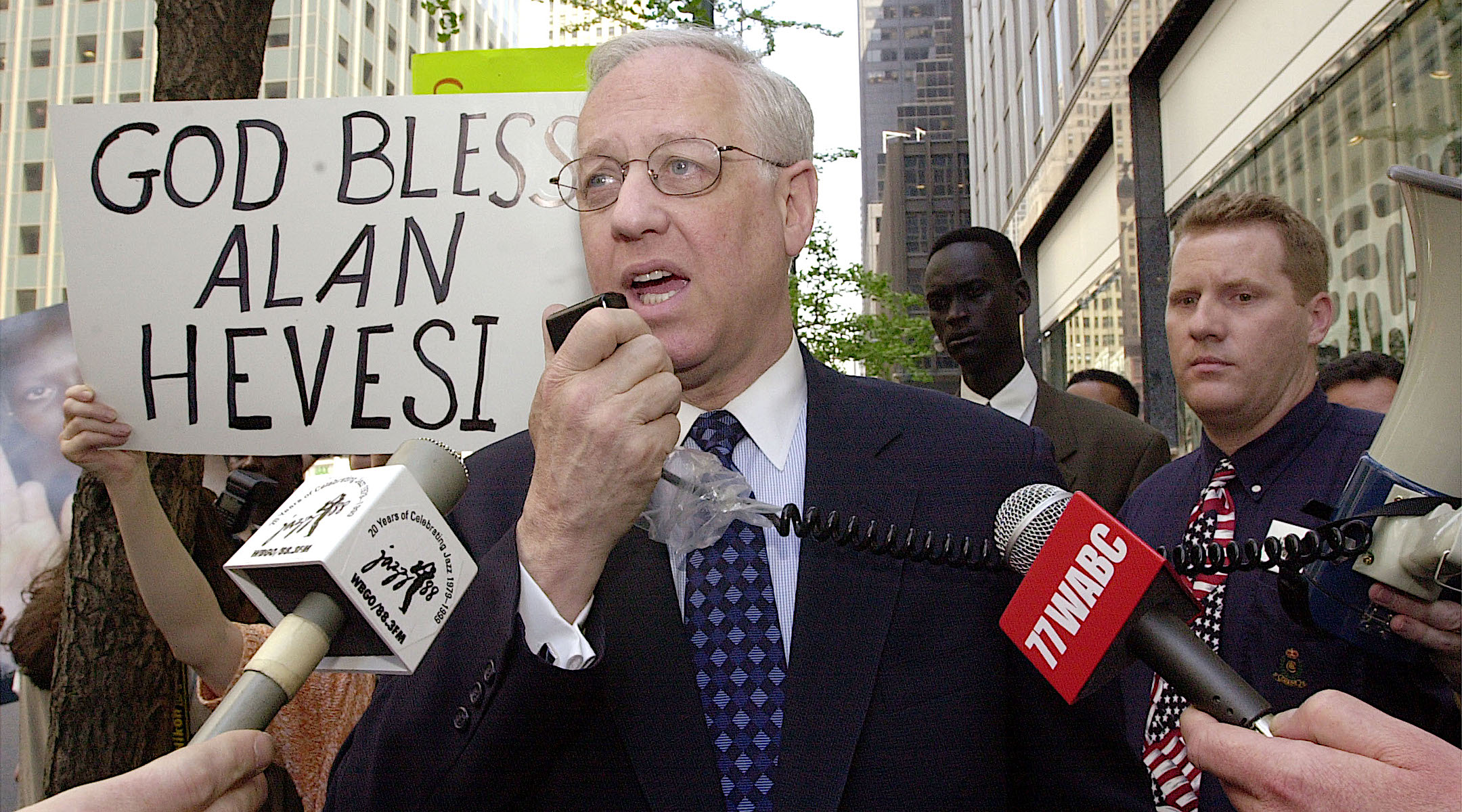Alan Hevesi, tarnished NYC pol who championed Holocaust restitution, dies at 83
The former city comptroller pressured banks to provide restitution before pleading guilty to unrelated corruption charges

Alan Hevesi, running for mayor of New York, speaks at an anti-slavery protest in front of the New York Mission to Sudan, May 2, 2001. (Spencer Platt/Newsmakers via Getty)
(New York Jewish Week) — Former New York City Comptroller Alan Hevesi, grandson of a chief rabbi of Budapest and a leader in the fight to recover assets of Holocaust survivors before corruption charges ended his political career, died Thursday in an assisted living home on Long Island. He was 83.
The nearly lifelong resident of Forest Hills represented the Queens, New York community in the state Assembly for more than 20 years before being elected city comptroller in 1993. Using the gears of government, in 1997 he barred the Union Bank of Switzerland (UBS) from leading a $1.3 billion letter of credit deal with the city, punishing the bank for failing to cooperate fully in helping Holocaust victims recover lost assets.
The next year he outlined sanctions on Swiss banks in an effort to force them to continue negotiations on lost and stolen assets in their coffers. He also pressured Deutsche Bank, which was seeking to buy New York-based Bankers Trust Corp., to contribute to a slave-labor reparations fund.
“I believe that if international institutions want to participate in the global economy they have to accept global values, and providing restitution for Holocaust survivors is part of that,” Hevesi told the N.Y. Daily News in 1998.
He was elected state comptroller in 2002 after losing the Democratic primary for mayor the previous year.
He resigned from office in 2006, after winning a second term, in a plea bargain with the Albany District Attorney in which he admitted using state employees and vehicles to chauffeur his ailing wife, Carol. In 2010, he pleaded guilty to a second-degree corruption charge, acknowledging he accepted $1 million in gifts from a friend and political backer. For that charge he served 20 months in prison.
“I want them to see [the mistake] in the context of a 35-year career in public service,” he told the Forward in 2006, referring to his former supporters. “I wrote the nursing home reform law. I wrote the law saying there will be no medical experiments on human beings — based on the Nuremberg [Code]. I think there’s been a rush to judgment.”
Hevesi, who was born in Manhattan, was the son of Jewish immigrants who left Hungary in 1938 to escape the Nazis. His paternal grandfather, Simon Hevesi, was rabbi of Budapest’s famed Dohány Street synagogue, and served as the chief rabbi of Hungary from 1927 until his death in 1943. Of the relatives who remained in Hungary, 55 were murdered in concentration camps.
Hevesi’s father, Eugene, was an official with the American Jewish Committee. His mother, Alicia, was a music publisher. Alan Hevesi was president of the Bnai Zion fraternal organization in the early part of the 2000s and often attended meetings of the Conference of Presidents of Major American Jewish Organizations. As comptroller he made investment in Israel a priority, including $100 million in biotech and other industries there, arguing that they not only helped the Jewish state but would bring solid returns for New York’s pension-holders.
Carol, his wife, died in 2015. Survivors include Andrew Hevesi, an Assembly member from Queens; Daniel Hevesi, a former State Senator; a daughter, Laura Hevesi, and three grandchildren.
This article originally appeared on JTA.org.














